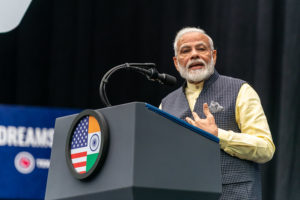
Prime Minister Narendra Modi of India addresses his remarks on stage Sunday, Sept. 22, 2019, at a rally in honor of Prime Minister Modi at NRG Stadium in Houston, Texas. (Official White House Photo by Shealah Craighead)
Last week, India’s Prime Minister, Narendra Modi, signaled a change in his government’s position on the war in Ukraine. Whereas India had maintained a neutral stance on the issue, Modi signaled to Vladimir Putin and the world that India was interested in seeing an end of the conflict. India reiterated its change in posture when shortly thereafter its diplomats voted to allow Ukrainian President Volodymyr Zelensky the opportunity to virtually address the United Nations. Sumit Ganguly reports on the changes in Foreign Policy, writing:
At last week’s Shanghai Cooperation Organisation (SCO) summit in Samarkand, Uzbekistan, Indian Prime Minister Narendra Modi’s remarks toward Russian President Vladimir Putin—upbraiding Russia’s war in Ukraine—surprised observers both in New Delhi and around the world. During their bilateral meeting last Friday, Modi said that “today’s era is not of war” and that Putin should “move onto a path of peace.” Within hours, New Delhi also voted in favor of a resolution to allow Ukrainian President Volodymyr Zelensky to virtually address the United Nations General Assembly in New York.
Both gestures marked a striking departure from the studiously neutral stance that India had previously adopted toward Russia’s war in Ukraine. New Delhi has abstained on every U.N. resolution condemning Russia’s actions against Ukraine. So, what explains this seemingly abrupt shift in India’s position, and will the change make any material difference to the outcome of the conflict?
The first question has at least three plausible answers, while the second depends on several unresolved factors.
Modi’s meeting with Putin may show that after avoiding confronting Russia about the invasion, India has finally decided to distance itself for compelling reasons. On one level, New Delhi has become increasingly uncomfortable with Moscow’s willingness to cozy up to Beijing, its principal and long-term security threat. On another, India wants to avoid alienating the United States and its other partners in the Quadrilateral Security Dialogue, or the Quad—all of which have adopted an unyielding position on Russia’s war in Ukraine. Maintaining good relations with the Quad members and especially the United States is important for a strategy that keeps India’s options open, especially if an increasingly isolated Russia courts China.
A second possible explanation is that some members of the Indian foreign-policy establishment have concluded that India’s uncritical stance on Russia’s war in Ukraine does not serve its long-term interests. Furthermore, these officials may have inferred that Washington’s willingness to give New Delhi a pass on the issue is reaching the end of its tether. Given the growing significance of the U.S.-India security partnership, New Delhi can’t really afford to keep ignoring U.S. concerns. Unsurprisingly, Modi’s comments were greeted favorably in Washington.
It is also entirely possible that India’s shift can be attributed to a mix of the above explanations—namely, that New Delhi has become wary of the closeness between Beijing and Moscow while members of the foreign-policy apparatus have also sounded the alarm about its dependence on Moscow.
Finally, a slightly more conspiratorial explanation from some analysts suggests that Modi’s statement was carefully coordinated with Russia ahead of the SCO summit. After the meeting, prominent Indian political commentator Manoj Joshi argued that Putin appeared to take Modi’s remarks in stride, saying, “We want all this to end as soon as possible.” This argument is based in part on inference, but India’s continuing dependence on Russian energy imports and advanced weaponry means that it can’t be written off as fantasy. Chiding Putin without fanfare finally allowed India to seize the moral high ground and win favor with the West—without damaging its relationship with Russia, which still depends on India for diplomatic cover. Given the historic closeness of the relationship, this scenario could have been arranged in advance.
Without unequivocal evidence, it’s hard to say which of these explanations is most accurate. However, there is little question that India’s more nuanced position has enabled it to accomplish multiple goals without significant costs. To some degree, Modi’s comments assuaged concerns in the United States and Western Europe around India’s willingness to stand up to Russia amid a crisis with global ramifications, including drastic food shortages and soaring energy costs. Simultaneously, New Delhi has conveyed a subtle message to Moscow that its support is not unwavering. Given Russia’s growing isolation, India’s public willingness to step away must at least somewhat worry Putin. New Delhi’s shift probably also conveyed a message to Beijing: Among other matters, Modi scrupulously avoided meeting Chinese President Xi Jinping on the sidelines of summit.
If you’re willing to fight for Main Street America, click here to sign up for the Richardcyoung.com free weekly email.




